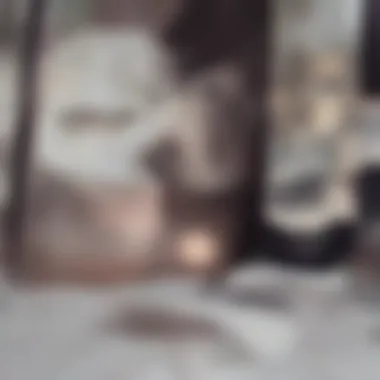Understanding MSC Cancer: Mechanisms and Future Directions


Intro
Mesenchymal stem cells (MSCs) are a type of multipotent stem cell with the ability to differentiate into various cell types. Their relevance in the field of oncology has garnered significant attention. Understanding the complex roles these cells play, both in tumor progression and therapy, is crucial. This article will explore the intricate relationship between MSCs and cancer, emphasizing their mechanisms, implications, and future directions in research and clinical practice.
Background and Context
Overview of the Research Topic
Mesenchymal stem cells reside in various tissues and possess unique properties, such as self-renewal and multi-lineage differentiation. Their ability to modulate the immune response makes them a focal point in cancer research. Research indicates that MSCs can either support or inhibit cancer growth. This duality complicates the understanding of their role in oncology. The study of MSCs in cancer biology was sparked by observations of their presence in tumor microenvironments. This research context provides a basis for deeper exploration.
Historical Significance
Historically, MSCs were primarily studied for their potential in regenerative medicine. Early research focused on their ability to differentiate into cell types relevant to tissue repair. However, as studies evolved, researchers began to notice the interaction between MSCs and tumor cells. This shift in focus has led to an increase in understanding of how MSCs can influence cancer development. Notably, significant findings have emerged from studies investigating the secretome of MSCs, revealing factors crucial in tumor progression.
Key Findings and Discussion
Major Results of the Study
Recent research illustrates that MSCs can influence various phases of tumor development. They have been observed to promote angiogenesis, support tumor cell proliferation, and inhibit apoptosis in cancerous cells. Conversely, MSCs also exhibit potential anti-tumor properties, such as inducing cell death in certain contexts. These findings underscore the importance of the tumor microenvironment in mediating MSC functions.
Detailed Analysis of Findings
A comprehensive analysis reveals that the effects of MSCs on cancer biology depend on several factors, including:
- Tissue of origin: MSCs from different sources behave differently in the tumor microenvironment.
- Tumor type: Cancer cells may respond differently to MSC interactions based on their specific characteristics.
- Cytokine milieu: The presence of various cytokines and growth factors can tilt the balance toward either promotion or suppression of tumor growth.
The challenge lies in harnessing the beneficial properties of MSCs while mitigating their potential to facilitate tumor growth. Emerging research is investigating ways to modulate MSC behavior to enhance their utility in therapeutic strategies.
"The duality of mesenchymal stem cells in oncology presents both opportunities and challenges that necessitate careful investigation."
Prelims to Mesenchymal Stem Cells
Mesenchymal stem cells (MSCs) are pivotal in understanding various biological processes and their implications in health and disease, particularly cancer. This section lays the groundwork for diving into the complexities of MSCs, illuminating their roles beyond conventional perceptions as mere building blocks for tissues. By focusing on MSCs' characteristics, sources, and differentiation potentials, we can appreciate how these cells contribute to the ever-evolving landscape of cancer biology.
Influencing both the tumor microenvironment and host immune responses, MSCs exhibit versatility that is interesting in oncology. The significance of studying MSCs arises not only from their therapeutic potential but also from their capacity to facilitate tumor progression. Understanding these dynamics is essential, as we explore the mechanisms behind the MSC-cancer relationship in later sections.
Definition and Characteristics
Mesenchymal stem cells are a type of multipotent stromal cell. They possess the unique ability to differentiate into various cell types, impacting the development and repair of tissue. Key characteristics include their self-renewal ability, plasticity, and expression of surface markers like CD73, CD90, and CD105. These attributes make MSCs prime candidates for research in regenerative medicine and cancer therapy.
Sources of MSCs
MSCs can be derived from numerous tissues, each providing unique insights and applications. The key sources include:
Bone Marrow
Bone marrow is one of the most studied sources of MSCs. Its contribution to MSC research is substantial due to its rich supply of hematopoietic and mesenchymal stem cells. The key characteristic of bone marrow MSCs is their ability to differentiate into various cell types, including adipocytes, chondrocytes, and osteoblasts. This versatility makes them a beneficial choice in research and clinical applications. However, harvesting these cells can be invasive and may present ethical concerns.
Adipose Tissue
Adipose tissue has gained attention as a non-invasive source of MSCs. They are abundant and easy to isolate, which contributes to their popularity in research. The key characteristic of adipose-derived MSCs is their greater proliferation potential compared to bone marrow-derived MSCs. This allows for easier large-scale expansion. However, there may be variability in cell properties depending on the donor's age and metabolic status, which can complicate their applicability in therapy.
Umbilical Cord
Umbilical cord-derived MSCs represent a source with minimal ethical dilemmas, as they are collected from afterbirth without harm to the donor. These cells are considered to have a more 'naive' phenotype, which could translate to robust immunomodulatory properties. Their distinct advantage includes a higher proliferative capacity and greater differentiation potential compared to their bone marrow and adipose counterparts. Yet, their availability is limited to the time of delivery, constraining their widespread use in clinical applications.


Differentiation Potentials
Understanding the differentiation pathways of MSCs enhances their therapeutic potential, particularly in cancer. Three critical pathways of differentiation include:
Chondrogenesis
Chondrogenesis is the process by which MSCs differentiate into chondrocytes, which are vital for cartilage formation. This potential contributes to regenerative medicine, particularly in joint diseases. Chondrogenesis represents a beneficial aspect of MSC therapy, promoting tissue repair. Conversely, the limited vascularization of cartilage may pose challenges in its application in large defects.
Osteogenesis
Osteogenesis involves the conversion of MSCs into osteoblasts, essential for forming bone tissue. This characteristic is crucial given the increasing incidence of bone-related disorders in cancer patients. The ability of MSCs to assist in bone regeneration offers significant therapeutic promise. However, the intricate balance required for effective bone formation can complicate treatment outcomes.
Adipogenesis
Adipogenesis is the differentiation of MSCs into adipocytes, the cells that form adipose tissue. This pathway is crucial in metabolic regulation and influences cancer biology as well. Enhancing adipogenic potential can aid in understanding the link between obesity and cancer. However, the exact role and implications of adipose tissues often need to be further clarified in oncological contexts.
MSCs in Cancer Pathophysiology
Mesenchymal Stem Cells (MSCs) are crucial players in the understanding of cancer pathophysiology. Their unique abilities to interact with different cell types and their role in various biological processes make them essential for studying tumor biology and development. This section will explore how MSCs contribute to the tumor microenvironment and their dual roles that can either promote or suppress tumor progression.
Role of MSCs in Tumor Microenvironment
Cellular Interactions
Cellular interactions between MSCs and tumor cells are pivotal in shaping the tumor microenvironment. MSCs can regulate the behavior of cancer cells through direct cell-to-cell contact and paracrine signaling. This characteristic is important because it establishes a dynamic environment where tumor cells can thrive. The interaction allows for the transfer of various signals that can activate pathways in tumor cells, promoting growth and survival. One of the unique features of cellular interactions is their adaptability. Depending on the specific context, MSCs can either support or inhibit tumor growth, presenting a complex landscape in cancer dynamics.
Cytokine Production
Cytokine production by MSCs significantly influences the surrounding tumor microenvironment. These cells secrete various cytokines, which can modulate immune responses and also impact tumor growth. This feature is beneficial as it underlines the potential of MSCs to communicate with immune cells, potentially skewing the local immune response in favor of tumor cells. Moreover, the regulation of cytokine production by MSCs can lead to either pro-inflammatory or anti-inflammatory outcomes, which poses both advantages and disadvantages for the immune landscape in tumors. Such variability highlights the need for a deeper examination of cytokine signaling in the context of cancer.
Extracellular Matrix Remodeling
Extracellular matrix remodeling is another critical aspect of how MSCs influence cancer pathophysiology. MSCs actively participate in modifying the extracellular matrix, which can affect tumor invasion and metastasis. This ability to remodel the matrix enables tumor cells to migrate more easily and establishes a more favorable environment for cancer progression. The unique feature of matrix remodeling is its dual effect; while it can assist tumor growth, it may also provide therapeutic targets to hinder tumor spread. Understanding this aspect is vital for developing innovative strategies in cancer treatment.
MSCs as Tumor Promoters
Immune Evasion
Immune evasion is a significant mechanism through which MSCs contribute to tumor growth. By creating an immunosuppressive microenvironment, MSCs can inhibit the anti-tumor responses of immune cells. This characteristic makes MSCs popular subjects of study, as targeting immune evasion could lead to enhanced effectiveness of cancer therapies. The unique feature of immune evasion lies in its complexity and variability, depending on the tumor type and context. Therefore, this understanding is crucial for developing improved treatment strategies that could counteract immune suppression.
Angiogenesis
Angiogenesis, the formation of new blood vessels, is another process influenced by MSCs. They release factors that promote angiogenesis, facilitating tumor growth by ensuring a continuous supply of nutrients and oxygen. This characteristic is beneficial as it sheds light on how tumors can sustain themselves and encourages research into anti-angiogenic therapies. However, while promoting angiogenesis is advantageous for tumor survival, it presents challenges for therapy, as blocking this process can also affect normal tissue.
Metastatic Behavior
Metastatic behavior is significantly influenced by MSCs, which can enhance the ability of cancer cells to invade surrounding tissues and spread to distant sites. The unique feature of their involvement in metastasis highlights the role of environmental cues from MSCs guiding cancer cells. This dual role makes the study of MSCs imperative in understanding tumor biology. While this brings insights into tumor aggressiveness, it also underscores the necessity for strategies to inhibit metastatic spread.
MSCs in Tumor Suppression
Apoptosis Induction
Apoptosis induction by MSCs represents a mechanism of tumor suppression. Certain MSCs can stimulate cell death pathways in tumor cells, providing a potential avenue for therapeutic intervention. This feature makes MSCs an interesting perspective for therapy, as their ability to induce apoptosis could lead to elimination of cancer cells. However, the challenge lies in selectively enhancing this effect without impacting normal cells, necessitating further research into the conditions under which this induction occurs.
Tumor Cell Differentiation
MSCs potentially influence tumor cell differentiation, pushing cancer cells towards less aggressive phenotypes. This capability is essential as it may provide strategies for limiting tumor progression and increasing treatment efficacy. The unique aspect of tumor cell differentiation displays the plasticity of cancer cells which MSCs can affect. While beneficial, this approach requires careful modulation as differentiation effects can vary widely among different tumor types.


Potential for Immunotherapy
The potential for the use of MSCs in immunotherapy represents a promising area of research. By harnessing the properties of MSCs to regulate immune responses, researchers aim to enhance the effectiveness of immunotherapeutic agents. This characteristic is appealing because it opens up new realms of possible therapies that could intervene in tumor growth. Nonetheless, the variability in response among different patients poses a significant hurdle that needs overcoming to ensure reliable outcomes in clinical settings.
Mechanisms of MSC-Cancer Interaction
The interaction between mesenchymal stem cells (MSCs) and cancer cells involves multiple mechanisms that influence cancer biology. These mechanisms are crucial to understanding how MSCs can both promote and suppress tumor growth. Studying these interactions can lead to better therapeutic strategies in oncology. This section explores essential pathways and concepts that elucidate MSC roles in cancer.
Signaling Pathways
Signaling pathways are important for understanding cellular communication and behavior. In the context of MSCs and cancer, they play significant roles in how these cells influence tumor development and progression.
Notch Pathway
The Notch pathway is important in cell communication. It helps control cell fate decisions and can influence how stem cells respond in the cancer environment. In this context, MSCs can interact with cancer cells through Notch signaling. This pathway is beneficial due to its role in maintaining stemness, which can also contribute to tumor growth. However, too much activation may promote aberrant cell behaviors leading to cancer progression.
One unique aspect of the Notch pathway is its ability to mediate interactions between MSCs and tumor cells, enabling both cell types to influence each other in the tumor microenvironment. This crosstalk can either support tumor survival or, conversely, induce differentiation in some cases.
Wnt Signaling
Wnt signaling is another vital pathway in both stem cell biology and cancer progression. This pathway encourages cellular processes such as proliferation and differentiation. In MSCs, Wnt signaling fosters self-renewal and has implications for tumor growth and metastasis.
One key characteristic of Wnt signaling is that it communicates signals that can suppress apoptosis in cancer cells, allowing more aggressive tumor phenotypes to thrive. This feature makes Wnt an attractive area of study in the pursuit of therapeutic targets. Nonetheless, the duality of its role is noticeable since inhibiting Wnt can also yield adverse effects, showcasing the delicate balance in these interactions.
NF-κB Pathway
The NF-κB pathway is crucial for regulating inflammation, which is often linked with cancer. MSCs, through NF-κB signaling, can produce cytokines that may enhance or inhibit tumor growth. This pathway is notable for its involvement in various cellular outcomes, ranging from survival to inflammatory responses.
A unique feature of the NF-κB pathway is its frequency of activation in many cancers, making it a prominent player in understanding how MSCs interact with tumors. The challenge lies in its potential to create a supportive environment for tumor growth while also providing avenues for therapeutic interventions to disrupt this pathway.
Epigenetic Modifications
Epigenetic modifications are essential in cancer biology as they can alter gene expression without changing DNA sequence. MSCs can undergo these modifications in response to their interaction with the tumor microenvironment. By observing how MSCs participate in the epigenetic landscape of cancers, researchers can gain insights into potential therapy targets.
Changes such as DNA methylation and histone modification may either silence or activate genes involved in tumor progression. Understanding these patterns allows for better comprehension of the role MSCs play in cancer evolution and highlights potential therapeutic windows to manipulate these changes for better outcomes.
Cellular Plasticity
Cellular plasticity refers to the ability of cells to change their phenotype in response to environmental cues. In the case of MSCs, this characteristic is critical when examining their relationship with cancer. Cellular plasticity enables MSCs to adapt and respond to the unique demands within the tumor microenvironment.
This adaptability sometimes unfolds as a disadvantage when MSCs acquire traits that favor cancer progression. For instance, they can differentiate into cells that support tumor growth and metastasis, contributing to the overall complexity of cancer treatment. Understanding this concept is vital for developing strategies that can utilize MSC properties while overcoming their potential to promote tumorigenesis.
The intricate mechanisms of MSC-cancer interaction open pathways for innovative research and therapeutic strategies.
In summary, the mechanisms of MSC-cancer interaction are multifaceted, involving signaling pathways, epigenetic changes, and cellular adaptability. Disentangling these interactions is critical for harnessing the potential of MSCs in cancer therapy.
Therapeutic Applications of MSCs in Oncology
The therapeutic applications of mesenchymal stem cells (MSCs) in oncology represent an exciting frontier in cancer treatment. MSCs offer unique properties that allow for diverse roles in cancer therapy. These properties include immunomodulation, regenerative capabilities, and the ability to target tumor sites. This section will explore the applications of MSCs in regenerative medicine, targeted drug delivery, and the challenges that arise in their clinical application.
MSCs in Regenerative Medicine
MSCs play an essential role in regenerative medicine, particularly in the context of oncology. Their immunosuppressive qualities help create a conducive environment for tissue repair. This is crucial after tumor resection, where the healing process needs support. Moreover, MSCs have been shown to enhance wound healing and reduce scar formation. Their ability to differentiate into various cell types allows for the potential repair of damaged tissues, which is especially beneficial in post-cancer rehabilitation. By facilitating tissue regeneration, MSCs can significantly improve the quality of life for cancer patients.
MSCs in Targeted Drug Delivery
Targeted drug delivery using MSCs has emerged as a promising strategy to enhance chemotherapy efficacy. MSCs can home to tumor sites due to the tumor microenvironment's unique signals. By engineering MSCs to carry therapeutic agents, researchers aim to increase the concentration of drugs at the tumor site while minimizing systemic side effects. This targeted approach improves drug efficacy and reduces the likelihood of damage to healthy tissues. Several preclinical studies have shown that MSCs can effectively deliver chemotherapeutic agents, presenting a potential leap forward in cancer treatment modalities.


Challenges in Clinical Application
Despite their potential, the clinical application of MSCs faces several challenges that must be addressed to translate research into practice.
Safety Concerns
One crucial aspect of safety concerns revolves around the risk of tumor formation from transplanted MSCs. There is a potential for uncontrolled cell division, which can lead to adverse outcomes in patients. Maintaining strict guidelines for cell sourcing and processing can help mitigate these risks. Additionally, the variability in MSC potency and biological behavior poses a challenge in ensuring patient safety.
Standardization Issues
Standardization issues present another significant hurdle in the clinical application of MSCs. Variability in MSC characteristics depending on the source, processing methods, and handling creates gaps in reproducibility. The lack of universal protocols complicates the comparison of clinical outcomes across different studies. Establishing standardized procedures is essential for the reliable use of MSCs in clinical settings, ensuring consistent results and effective patient treatment.
Ethical Considerations
Ethical considerations also play a vital role in the application of MSCs. Concerns arise from the methods used to obtain these cells, especially when deriving them from embryonic sources. Public perception and regulatory frameworks can influence research and clinical use. It is crucial to navigate these ethical dilemmas, ensuring that patient rights and informed consent are prioritized. Addressing ethical issues effectively can lend credibility to ongoing research and ultimately lead to broader acceptance of MSC applications in oncology.
Future Directions in MSC Cancer Research
The exploration of mesenchymal stem cells (MSCs) in cancer research holds significant potential for future therapeutic strategies. Understanding how MSCs interact with cancer can lead to improved treatment options, personalized therapies, and ultimately better patient outcomes. The field is rapidly evolving as scientists seek to harness the properties of MSCs to either inhibit or promote tumor progression. This dual aspect underscores the necessity for ongoing research focused on innovative methodologies and treatment integrations.
Innovative Research Approaches
Work on Personalized Medicine
Personalized medicine is an approach that tailors treatment based on the individual characteristics of each patient. In the context of MSCs and cancer, this could mean customizing therapies to the genetic and epigenetic profile of the tumor. The advantage of personalized medicine is its potential to improve efficacy and reduce adverse effects. It allows for a finer targeting strategy when applying MSCs in treatment. However, this approach can be complex due to the need for extensive molecular profiling and the variation in responses to therapy among individuals. Therefore, while promising, it requires careful implementation and validation.
Targeting Specific Tumor Types
Focusing on specific tumor types can enhance the efficacy of MSC-based therapies. Each cancer type has unique cellular and molecular characteristics. By targeting these characteristics, researchers can devise strategies that optimize treatment. Tailored therapies could lead to more efficient tumor suppression while minimizing damage to healthy tissue. However, the challenge lies in identifying reliable markers that can be routinely used in clinical settings. The specificity offered by this approach is a key reason for its growing interest in this field.
Integrating MSCs with Other Treatments
Chemotherapy
Chemotherapy is a traditional cancer treatment that uses powerful drugs to kill rapidly dividing cells. When integrated with MSCs, the idea is to enhance the effect of chemotherapy. MSCs may help in reducing the side effects associated with these drugs, potentially improving the patient’s quality of life during treatment. However, one limitation is the timing and method of integration, as MSCs could also support tumor growth in some scenarios, making this combination a double-edged sword.
Radiation Therapy
Radiation therapy employs high doses of radiation to kill cancer cells. The integration of MSCs could offer protective effects to normal tissues while targeting the tumor. This dual function can help in reducing damage caused by radiation, which is a significant concern with this treatment. Nonetheless, understanding the exact biological interactions between MSCs and radiation is crucial to avoid unintended tumor-promoting effects.
Immunotherapy
Immunotherapy is a promising cancer treatment that utilizes the body's immune system to fight cancer. MSCs can modulate the immune response, potentially enhancing the effects of immunotherapy. Their ability to influence immune cell activity may help in creating a more robust anti-tumor response. However, these interactions can also be complex, requiring thorough investigation to establish protocols where MSCs support rather than undermine the therapeutic effects of immunotherapy.
Potential for Gene Editing Technologies
The application of gene editing technologies, such as CRISPR, offers new avenues for manipulating MSCs to enhance their anti-tumor properties. Through precise genetic alterations, it might be possible to create MSCs that can specifically target and kill cancer cells. This innovative approach not only expands the capabilities of MSCs in therapy but also paves the way for breakthroughs in personalized medicine. However, ethical concerns and potential off-target effects must be addressed.
In summary, the future of MSC cancer research appears bright, marked by innovative approaches and significant therapeutic potential. Yet, these advancements come with challenges that require careful navigation to maximize benefits and minimize risks.
Epilogue
The conclusion is a crucial component of this article, encapsulating the essence of what has been explored about mesenchymal stem cells (MSCs) and their relationship with cancer. It serves not only to summarize the findings but also to emphasize the significance of understanding these dynamics for future therapeutic interventions. The dual role of MSCs as both facilitators of tumor progression and potential therapeutic agents highlights the complexity of cancer biology. This duality reinforces the need for nuanced approaches in research and treatment strategies.
Summary of Findings
The exploration of MSCs in the context of cancer reveals several key insights. First, the ability of MSCs to interact with tumor microenvironments significantly influences cancer progression. Cellular interactions, cytokine production, and extracellular matrix remodeling are pivotal in defining whether MSCs act to promote or suppress tumors. Second, the mechanisms of MSC-cancer interaction, including specific signaling pathways such as Notch and Wnt, underline the complexity of MSC behavior in oncological settings. Third, therapeutic applications of MSCs, particularly in regenerative medicine and targeted drug delivery, hold promise but come with challenges such as safety concerns and ethical considerations. The findings collectively paint a picture of MSCs as valuable players in cancer biology, meriting further investigation.
Call for Further Research
Despite the progress made in understanding the role of MSCs in cancer, significant gaps remain. Future research should focus on personalized medicine to tailor MSC therapies to individual patient profiles. This customization could enhance the efficacy and minimize side effects. Additionally, targeting specific tumor types may reveal unique interactions between MSCs and cancer cells, leading to more effective treatment strategies.
Integrating MSCs with existing therapies such as chemotherapy, radiation therapy, and immunotherapy also warrants thorough investigation. This approach might improve outcomes and mitigate resistance mechanisms observed in malignancies. Furthermore, exploring gene editing technologies offers exciting possibilities for enhancing the functionality of MSCs as therapeutic agents. By addressing ethical considerations and standardization issues, the scientific community can pave the way for groundbreaking advancements in oncology informed by MSC research.







